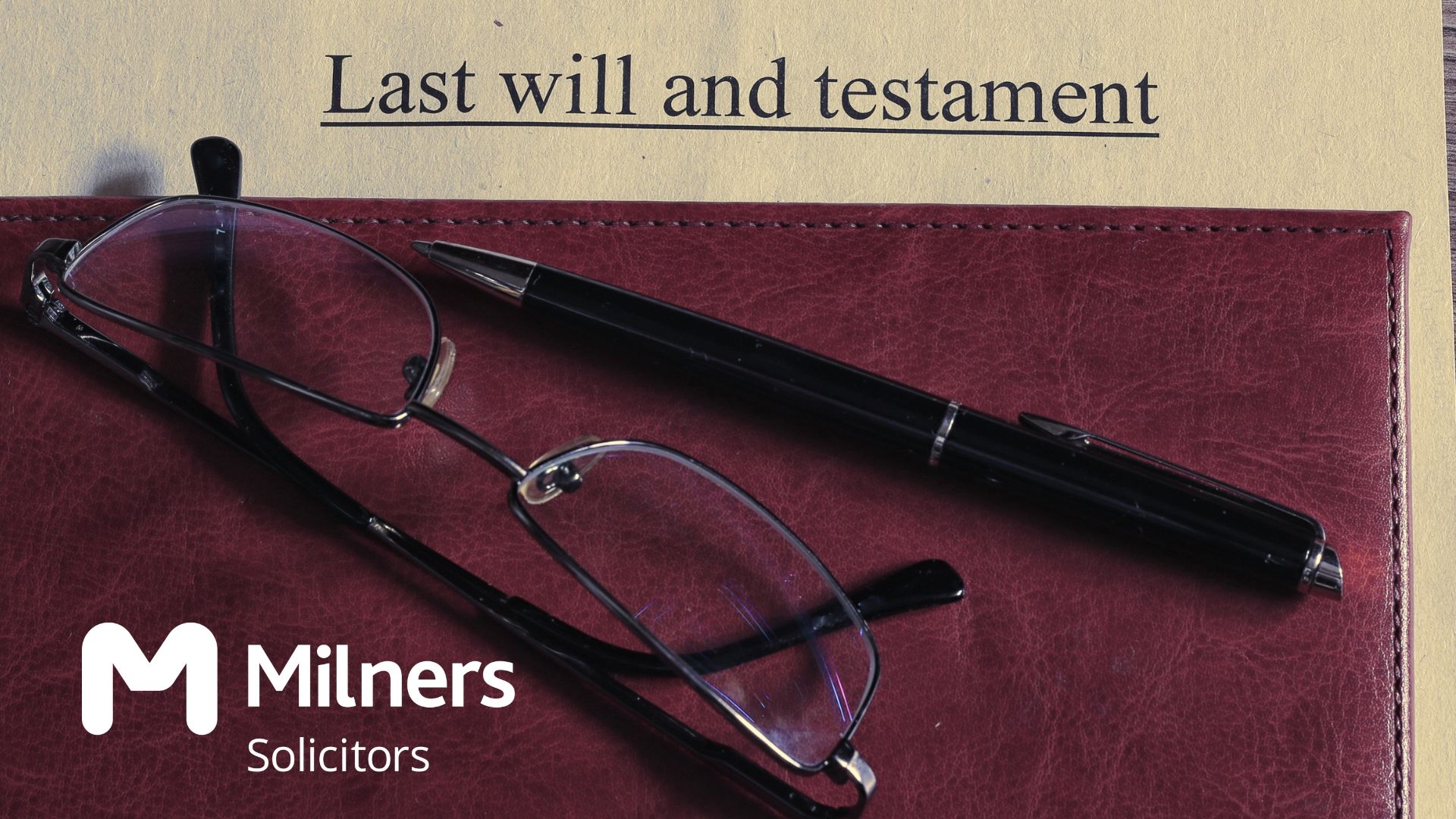Probate is a legal process that most of us have to face at some point. It attracts a lot of misconceptions. Join us as we bust 10 of the most common.

Probate is a legal process that often, but not always, has to be carried out following a person's death. It involves either distributing assets among the beneficiaries named in the will or, if there is no will, distributing them according to the rules of intestacy.
Like many legal matters,
probate is one of those things that you don't need to know about until you do. One day, you find yourself having to take a crash course in an area of law that's not always easy to untangle.
Here at Milners, we strive to make the probate process as straightforward and jargon-free as possible. That's why we've put together this guide, debunking ten probate myths and setting the record straight.
1. Probate is always necessary
NOT TRUE.
Probate is often required, but not always. Some estates are simpler than others. In the following cases, for example, it's unlikely you'll have to go through probate:
- If all of the deceased's assets were jointly owned by someone who's outlived them.
- If the estate doesn't contain property.
- If the estate involves a small amount of money.
The more complex the estate, the more likely it is that you'll have to go through the probate process.
2. Probate is always slow
NOT TRUE.
Like many legal processes, probate is as long as a piece of string. Its duration depends entirely on the complexity of the case (and, at the time of writing, a backlog of cases in the probate system).

Some estates can be dealt with in a matter of weeks. However, the number of beneficiaries could drag out the process – as could any disputes or other complexities that need to be ironed out.
3. Probate isn't affected by marriage, civil partnership, divorce or dissolution
NOT TRUE.
When you get
married or enter into a
civil partnership, your will is automatically invalidated. Divorce or dissolution doesn't entirely revoke the will – but the ex-spouse will no longer be a beneficiary, executor or trustee.
It's really important to revise your will upon marriage or civil partnership – otherwise, it could make the probate process more complicated than necessary.
4. The will must be read out formally
NOT TRUE.
We've all seen it in films and read it in books – the family gathered around, hearing the contents of the will read out by a solicitor.

In fact, this isn't a compulsory part of the probate process. Instead, it goes something like this.
First, the executors of the will contact named beneficiaries and distribute the estate according to the will. Once probate is granted, the will becomes a public document that can be viewed by anyone. However, some information can be kept private on request.
The executor has to distribute the will correctly and act in the best interests of the deceased. If they don't, they could be held liable.
However the process unfolds, you don't need a ceremonial reading of the will – just for all beneficiaries to be contacted promptly.
5. Anyone can apply for probate
NOT TRUE.
Only certain people have the right to apply for probate.
If the deceased left a valid will, only those who were named as executors can apply for probate. If there's no will, intestacy rules kick in. In this case, the deceased's close relatives are the only people who can apply for Letters of Administration on behalf of the estate.
6. Cohabitees are entitled to finances, property and guardianship rights
NOT TRUE.
Cohabitating couples have significantly fewer legal rights than married couples or civil partners. If one partner dies without leaving a
will, intestacy rules are triggered, and these don't provide for cohabiting couples.
This means that the members of a cohabiting couple should always write a will leaving assets to their partner.
7. Probate isn't necessary if the deceased left a will
NOT TRUE.
A will is a document that dictates how the estate should be distributed. It's not self-distributing. Probate is there to ensure that the distribution of assets among beneficiaries is above board.
8. If you're named as an executor, you have to be involved in probate
NOT TRUE.
Being named as an executor gives you the right to act in the administration of the estate. It doesn't bind you to do so.
If you're named as an executor and don't wish to be involved in probate for whatever reason, you can "renounce" your appointment. You can either step down entirely or have your "power reserved". This means that you step in only when necessary. This is sometimes done if the executor isn't local to the deceased or has health problems that make involvement difficult.
9. You can verbally relinquish your role as executor
NOT TRUE.
If you're named as an executor but don't want to carry out the role, you have to complete a formal renunciation. This has to be done before you get involved in any part of the probate process.
10. If there's no pre-paid funeral plan in place, the executors have to pay for the funeral
NOT TRUE.
The person who arranges the funeral is responsible for paying the bill – but the money doesn't have to be their own. It could also be paid for out of the deceased's bank account.

Typically, the bank will promptly release funds for funerals and will just ask to see the funeral director's invoice and the death certificate. They usually give priority to the funeral bill above all else (except for secured loans such as mortgages).
How we can help
Probate can be a tricky and stressful process, especially if you're grieving. Getting expert legal advice can make the process a lot smoother and resolve issues more quickly.
At Milners, we have teams of expert
probate solicitors in Leeds, Harrogate and Pontefract. They provide sensitive, thorough and knowledgeable advice that aims to make the process as painless as possible.
Don't see your question about probate answered here?
Get in touch for a free, no-obligation consultation.
![Judgment has been handed down this week in Transwaste Recycling and Aggregates Ltd [2024] EWHC 330 (](https://lirp.cdn-website.com/8f80b851/dms3rep/multi/opt/o+and+s-1920w.JPG)
Pontefract Office
9A High Street
Upton, Pontefract
West Yorkshire
WF9 1HR
Darlington Office
Close Thornton Solicitors
31 Houndgate
Darlington
DL1 5RH
Authorised and regulated by the Solicitors Regulation Authority – Milners, SRA # 52317 | VAT number: 170144301
All Rights Reserved | Milners Solicitors
Our branches
This is a paragraph. Writing in paragraphs lets visitors find what they are looking for quickly and easily.
This is a paragraph. Writing in paragraphs lets visitors find what they are looking for quickly and easily.
This is a paragraph. Writing in paragraphs lets visitors find what they are looking for quickly and easily.
This is a paragraph. Writing in paragraphs lets visitors find what they are looking for quickly and easily.
This is a paragraph. Writing in paragraphs lets visitors find what they are looking for quickly and easily.
Harrogate Office
11A Princes Square
Harrogate
North Yorkshire
HG1 1ND
01423 530 103
Darlington Office
Close Thornton Solicitors
31 Houndgate
Darlington
DL1 5RH
01325 466461
Pontefract Office
9A High Street
Upton, Pontefract
West Yorkshire
WF9 1HR
01977 644 864


Authorised and regulated by the SRA, SRA ID 52317
Get tips from our business and personal law legal experts. Delivered to your inbox each week.










